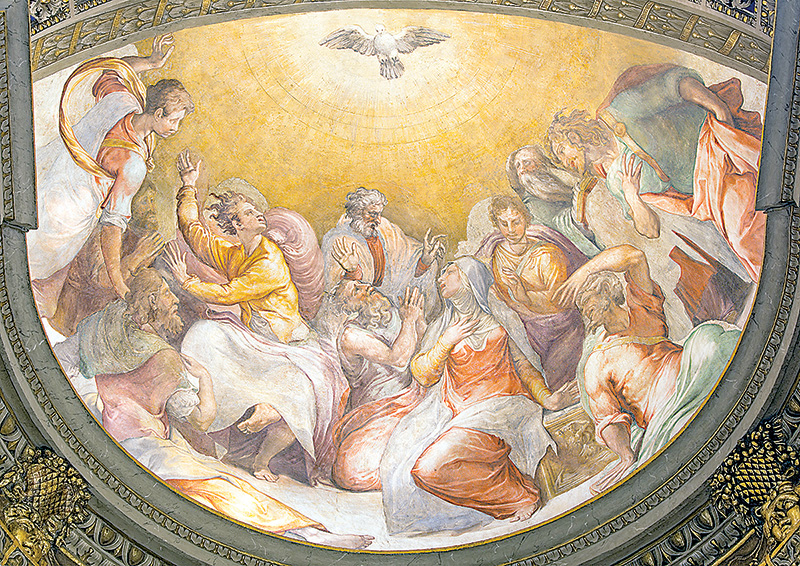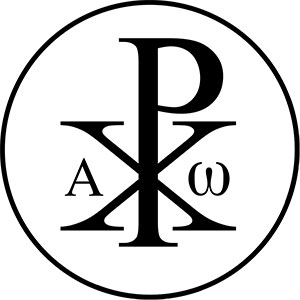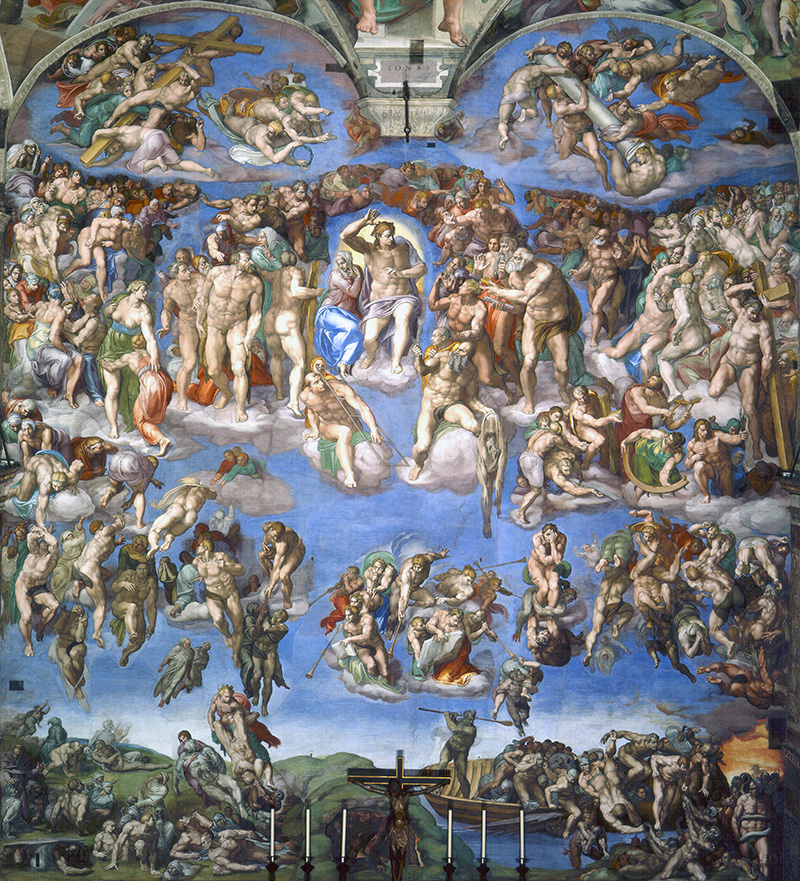
Credo: A 12-part series on the creed
Editor's note: This article is the eighth of 12 in a new series on the Creed by Deacon Matthew Newsome. Explore the series.
In the eighth article of the Apostles’ Creed we profess our belief in the Holy Spirit. What is a spirit? A spirit is a personal, non-corporeal being. Let’s break that down. It is a being, meaning that it is something that exists – spirits are not imaginary. It is non-corporeal, meaning that it is not physical. Spirits do not have matter; they are not made up of atoms or anything else in the material world. And it is personal, meaning spirits have rational intellects and free will.
Humans have spirits and physical bodies. Angels are pure spirits. But who is the Holy Spirit? The Holy Spirit is the spirit of God, but not in the same way souls are the spirits of human beings.
Humans have spirits, but we are not spirits, just like we have bodies but we are not bodies. We are spirit/body composites. God is not a composite being. God is one. You cannot break God down into parts.
God is also a Trinity. There are three Persons in God, but not three parts. Each Person of the Trinity is fully and wholly God, and all three are spirits. The Father is spirit. The Son is spirit. (The body He assumed at the Incarnation belongs to His human nature, not His divine nature.) And the Holy Spirit is spirit. When we confess in the Nicene Creed that “with the Father and Son He is adored and glorified” we affirm the divinity of the Holy Spirit by saying He is worthy of the same worship given to the Father and the Son.
So what makes the Holy Spirit different from the Father and Son, since all three are spirits? The Catechism defines the Holy Spirit as, “the personal love of Father and Son for each other… at work with the Father and the Son from the beginning to the completion of the divine plan for our salvation.” It is relatively easy for us to imagine the Father and the Son, as these are natural images for us (we all either have, are, or know human fathers and sons). But the Spirit is described variously as a wind, a flame and a dove. This can make it seem like the Spirit is harder for us to relate to, but in truth, the Spirit is most active in the world and in the life of the Church.
 The Holy Spirit is active in the work of creation itself. “In the beginning God created the heavens and the earth. The earth was formless and void, and darkness was over the surface of the deep, and the Spirit of God was moving over the surface of the waters” (Gen 1:1-2). The Holy Spirit gives order and purpose to the world, so that when God looks upon all He has made, He finds it “very good” (Gen 1:31).
The Holy Spirit is active in the work of creation itself. “In the beginning God created the heavens and the earth. The earth was formless and void, and darkness was over the surface of the deep, and the Spirit of God was moving over the surface of the waters” (Gen 1:1-2). The Holy Spirit gives order and purpose to the world, so that when God looks upon all He has made, He finds it “very good” (Gen 1:31).
The Holy Spirit is also active in a particular way in the creation of Man. “The Lord God formed man out of the clay of the ground, and blew into his nostrils the breath of life, and so man became a living being” (Gen 2:7). The word “breath” in Hebrew is “ruach” or “neshemah,” which in Latin is “spiritus.” God’s Spirit is the source of our life. Without it, we return to dust and ashes.
The Holy Spirit renews creation. “When You send forth Your spirit, they are created, and you renew the face of the earth” (Ps 104:29-30). In the same way, the Spirit renews and strengthens us. God tells us, “Take courage, for I am with you. My Spirit continues in your midst; do not fear” (Hag 1:4).
The Holy Spirit is also active in Jesus’ ministry. The Spirit overshadows Mary at the Incarnation (Lk 1:35). The Spirit anoints Jesus at His baptism (Lk 3:21) and leads Him into the desert to engage in spiritual combat with the devil (Lk 4:1-2). Jesus returns to Galilee saying, “The Spirit of the Lord is upon me because he has anointed me to bring glad tidings to the poor” (Lk 4:18).
On the day of the Resurrection, Jesus breathed on the Apostles saying, “Receive the Holy Spirit. Whose sins you forgive are forgiven them, and whose sins you retain are retained” (Jn 20:22).
It is the Holy Spirit who enables the Apostles to continue the redemptive work of Christ in the world. The Holy Spirit empowers the Church for its evangelizing mission. At Pentecost, “they were all filled with the Holy Spirit and began to speak in different tongues, as the Spirit enabled them to proclaim” (Acts 2:4).
The Holy Spirit also confirms each Christian as a member of the Church. “When the Apostles in Jerusalem heard that Samaria had accepted the word of God, they sent them Peter and John, who … laid hands on them and they received the Holy Spirit” (Acts 8:14, 17). The sacrament of confirmation is our anointing, our participation in Pentecost, our share in the apostolic mission to make disciples of all nations.
The Holy Spirit “comes to the aid of our weakness; for we do not know how to pray as we ought, but the Spirit itself intercedes with inexpressible groanings” (Rom 8:26). Jesus teaches that
“God is spirit, and those who worship Him must worship in Spirit and truth” (Jn 4:24). The Holy Spirit empowers our worship, “through Him, with Him and in Him, in the unity of the Holy Spirit.”
In the Mass, at the epiclesis, the priest calls down the Holy Spirit to “graciously make holy the gifts we bring to you for consecration” (Eucharistic Prayer III).
The Spirit makes us children of God. St. Paul writes that we have received “a Spirit of adoption… the Spirit itself bears witness with our spirit that we are children of God, and if children heirs, heirs of God and coheirs with Christ” (see Rom 8:14-17).
Finally, the Holy Spirit calls us to the consummation of our union with God in heaven. St. John writes in Revelation, “I saw the holy city, a new Jerusalem, coming down out of heaven from God prepared as a bride adorned for her husband. The Spirit and the Bride say, ‘Come’” (Rev 21:2).
In the fourth century, St. Basil the Great summarized the work of the Holy Spirit this way: “Through the Holy Spirit we are restored to paradise, led back to the Kingdom of heaven, and adopted as children, given confidence to call God ‘Father’ and to share in Christ’s grace, called children of light and given a share in eternal glory.” It is most fitting, therefore, for every Christian to pray,
“Come Holy Spirit, fill the hearts of Your faithful and kindle in them the fire of Your love.”
Deacon Matthew Newsome is the Catholic campus minister at Western Carolina University and the author of “The Devout Life: A Modern Guide to Practical Holiness with St. Francis de Sales,” available from Sophia Institute Press.
 Credo: A 12-part series on the creed
Credo: A 12-part series on the creed
Editor's note: This article is the seventh of 12 in a new series on the Creed by Deacon Matthew Newsome. Explore the series.
In the previous article of this series, we focused on Jesus’ Ascension into heaven. We now turn our attention to His Second Coming in glory to judge the living and the dead. The Catechism of the Catholic Church teaches that “Before His Ascension Christ affirmed that the hour had not yet come for the glorious establishment of the messianic kingdom awaited by Israel, which, according to the prophets, was to bring all men the definitive order of justice, love, and peace,” and calls this present age a time of “witness … waiting and watching” (CCC 672).
We wait with hope, because Christ, our Head, has conquered sin and death, and where the Head goes, the Body will follow. Our task in the intervening time is to give witness to His victory, to preach the good news to all nations, baptizing them and incorporating them into the Body until Christ has come to full stature. And because we do not know when the final consummation of the kingdom will come, we remain ever watchful for that day.
The fact that Jesus Himself says it is not for us to know the times and seasons the Father has established for these things hasn’t stopped many would-be prophets over the centuries from making predictions about when the Lord would return. The one thing these predictions have in common is that they have so far all been wrong.
That doesn’t mean the scriptures don’t offer any information about the end times. We are told that after “the full number of Gentiles” has entered the Church, “all of Israel will be saved” (Rom 11:25-26). Jesus speaks of wars, famines, earthquakes, persecution and false prophets that will precede the end, at which time the Son of Man will come with power and glory to gather the elect.
There has been no shortage of wars, famines and persecutions in the 20 centuries since the founding of the Church. False prophets are a dime a dozen. That is just as true today as it was in the first century. Every generation is tempted to look at calamitous events in the world and see them as signs of Christ’s coming. Those who warn that Christ is coming soon are not wrong: but what does “soon” mean to the One for whom a day is like a thousand years and a thousand years as a day (2 Pt 3:8)?
We are in the End Times and have been since the day of the Ascension. We just don’t know how long they will last. God has His own timing, as the scriptures teach us: “The Lord does not delay His promise, as some regard ‘delay,’ but He is patient with you, not wishing that any should perish but that all should come to repentance. But the day of the Lord will come like a thief, and then the heavens will pass away with a mighty roar and the elements will be dissolved by fire, and the earth and everything done on it will be found out” (2 Pt 3:9-10).
 While each of us faces our own particular judgment at the very moment of our death, it is at the final Judgment on the Last Day that “the conduct of each one and the secrets of hearts [will] be brought to light” (CCC 678). This public judgment is described by Christ as a sifting, or separation: sheep from goats, grain from chaff, wheat from weeds, good from bad, righteous from unrighteous, repentant sinners from unrepentant sinners, the humble from the proud, those who say “Thy will be done” from those who say “my will be done,” those who love God and neighbor from those who only love themselves. There will be no more secrets. All will be made manifest.
While each of us faces our own particular judgment at the very moment of our death, it is at the final Judgment on the Last Day that “the conduct of each one and the secrets of hearts [will] be brought to light” (CCC 678). This public judgment is described by Christ as a sifting, or separation: sheep from goats, grain from chaff, wheat from weeds, good from bad, righteous from unrighteous, repentant sinners from unrepentant sinners, the humble from the proud, those who say “Thy will be done” from those who say “my will be done,” those who love God and neighbor from those who only love themselves. There will be no more secrets. All will be made manifest.
There is a certain trepidation that can accompany our thoughts of this final, public judgment. No one likes to feel judged by others, so the prospect of a “Judgment Day” where our hidden deeds and secret thoughts will be revealed does not sound appealing. But our dislike of being judged stems from the fact that we are very often judged unfairly, too critically or unjustly. What we fear is being misjudged. But we needn’t fear this from Christ, who came not to condemn the world but to save it (Jn 3:17). He knows the secrets of our hearts. He knows and understands our woundedness, our limitations and our hidden motivations, and He is both perfectly just and merciful.
A healthy amount of “fear and trembling” at the prospect of our judgment can motivate us to turn away from sin and accept the mercy of God. Yet for those who love God and strive to live as Christian disciples, it should not be something we fear, but something we anticipate with great joy. The final Judgment means more than condemnation of sinners. It means vindication for the innocent, peace for the persecuted, joy for those who have mourned, justice for those who were oppressed, and freedom for those held captive. It is when all will be made right – not just for a time, but finally and forever. It is no wonder that one of the most ancient prayers of the Church is “marana tha,” “come, Lord” (1 Cor 16:22).
In the final dialogue between Christ and His Church recorded in the Bible, Jesus says, “Yes! I am coming soon,” and the Church replies, “Amen! Come, Lord Jesus!” (Rev 22:20). May that glorious day find us ready to welcome our Lord.
Deacon Matthew Newsome is the Catholic campus minister at Western Carolina University and the author of “The Devout Life: A Modern Guide to Practical Holiness with St. Francis de Sales,” available from Sophia Institute Press.
Pictured above: “The Last Judgment” by the Italian Renaissance painter Michelangelo. This fresco, which covers the entire altar wall of the Sistine Chapel, depicts the Second Coming of Christ and the final and eternal judgment by God of all humanity. The dead rise and descend to their fates as judged by Christ, who is surrounded by the Blessed Virgin Mary and prominent saints. Altogether there are more than 300 figures, with the saved ascending to Heaven on the left and the damned descending at the lower right.


 Credo: A 12-part series on the creed
Credo: A 12-part series on the creed